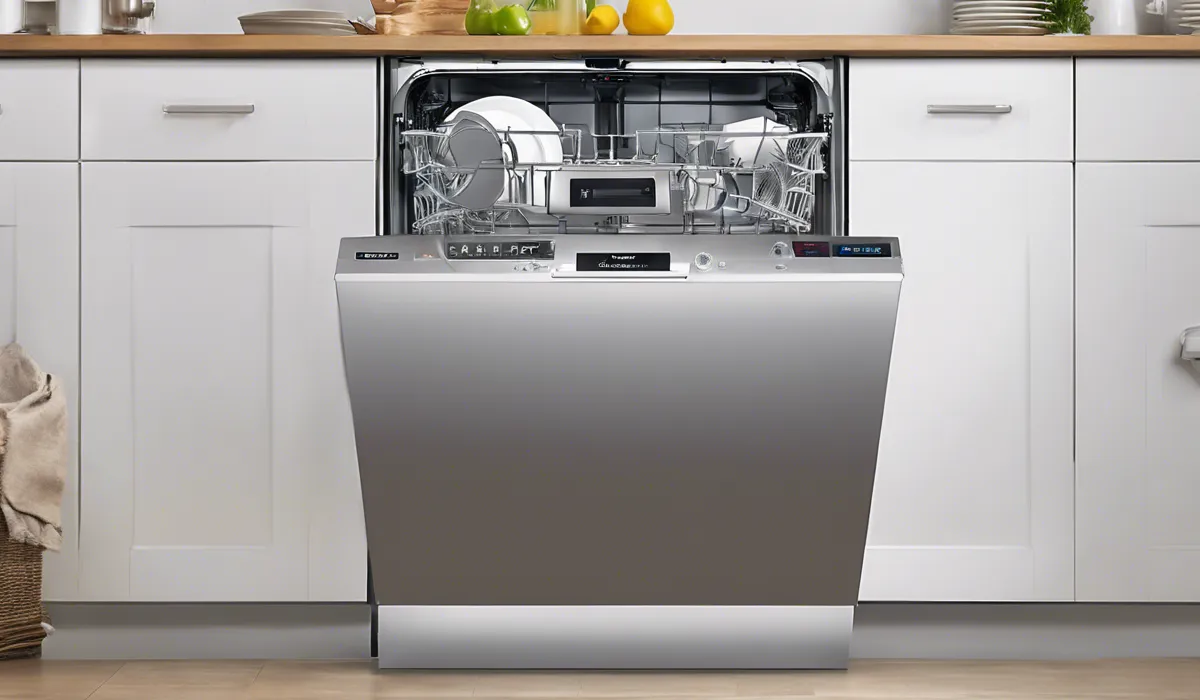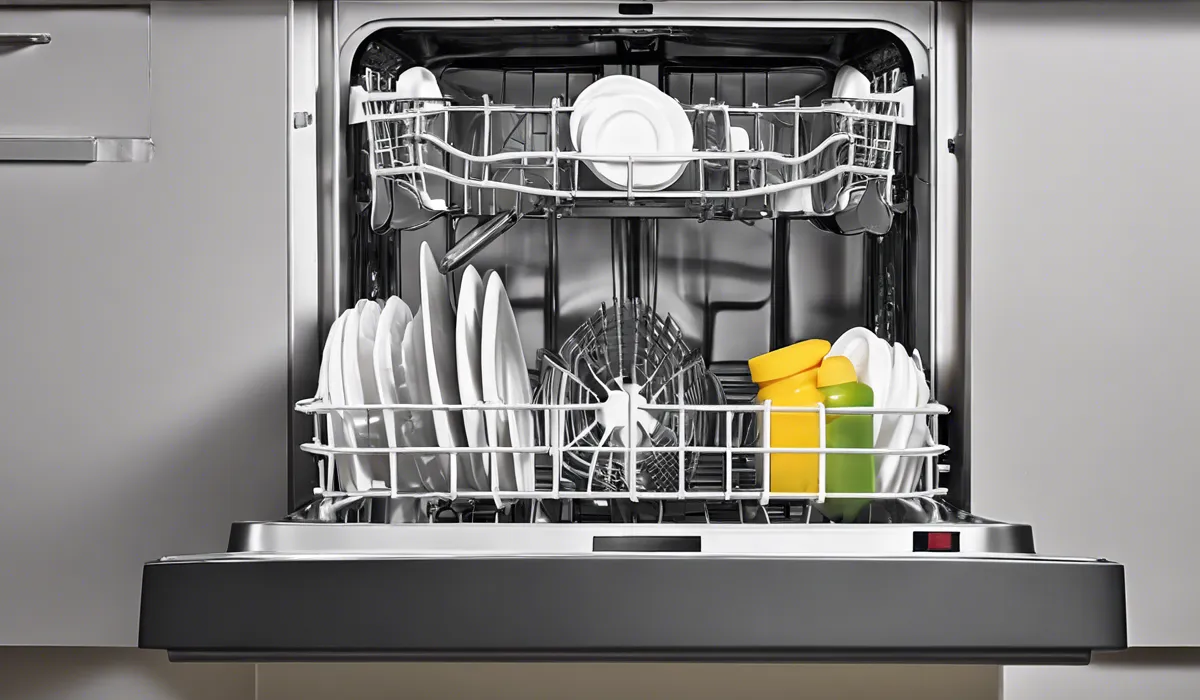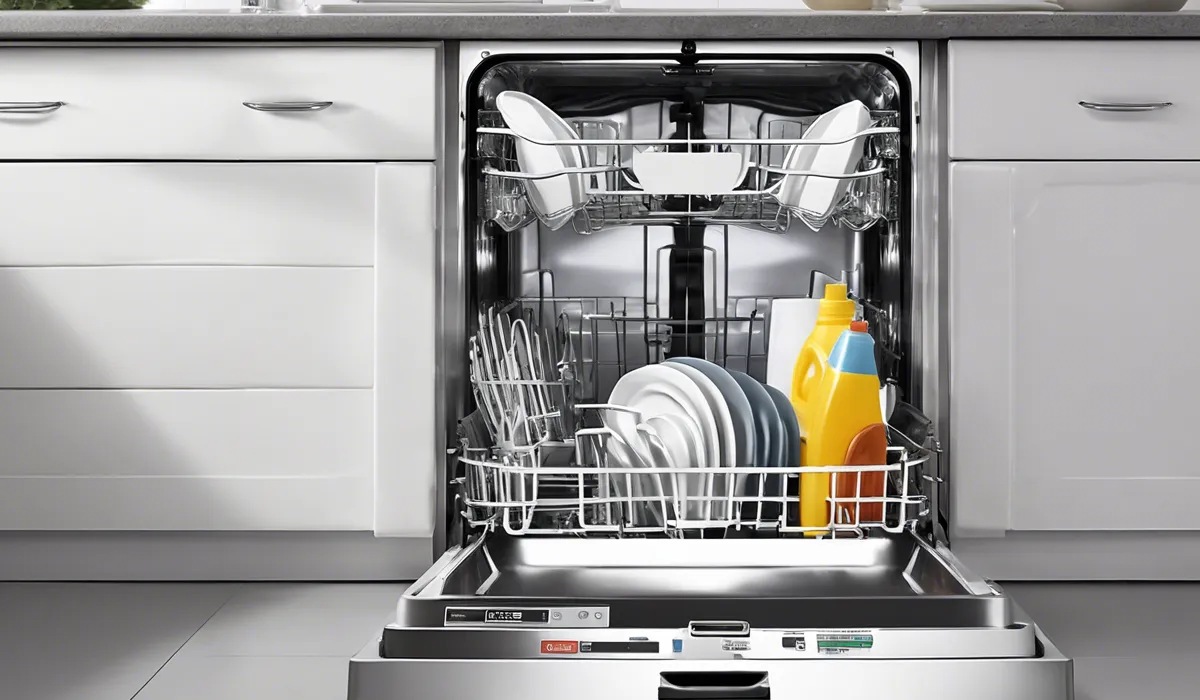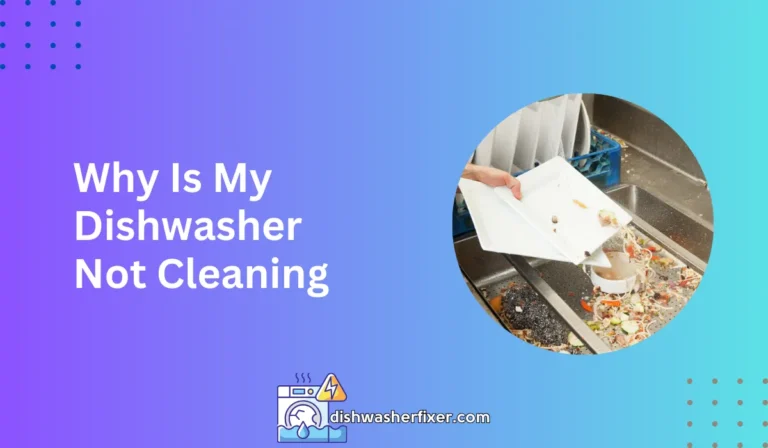What is in Dishwasher Cleaner? Unveiling Hidden Ingredients!
Dishwasher cleaner typically contains ingredients such as citric acid, sodium carbonate, enzymes, and surfactants. These components work together to remove grease, limescale, and mineral buildup, ensuring the dishwasher operates efficiently.
Ingredients in Dishwasher Cleaner

Chelating Agents
Chelating agents are the secret heroes in dishwasher cleaners. These components bind to metal ions in the water, such as calcium and magnesium.
By doing this, they prevent minerals from depositing on dishes and the dishwasher’s interior. Common chelating agents include citric acid and sodium tripolyphosphate.
They ensure that water remains soft throughout the cleaning cycle, which significantly enhances the effectiveness of detergents.
Enzymes
Enzymes in dishwasher cleaners act like tiny warriors that break down food residues. They tackle proteins, starches, and fats, breaking them into smaller molecules that can be easily washed away.
This biological approach to cleaning is highly effective and ensures that even the toughest food remnants do not stand a chance. Enzymes are a key ingredient for a spotless finish on dishes.
Surfactants
Surfactants are the muscle of dishwasher detergents. Their job is to reduce the surface tension of water, allowing it to spread and penetrate grime and grease effortlessly.
They surround and lift away dirt from dishes, ensuring that every plate, glass, and utensil comes out clean. Without surfactants, water droplets would not spread as effectively, and cleaning power would be reduced.
Bleach (Sodium Hypochlorite)
Bleach, particularly sodium hypochlorite, is a strong oxidizing agent found in many dishwasher cleaners.
It plays a crucial role in whitening and disinfecting. Bleach effectively removes tea and coffee stains, and it also kills a wide range of bacteria and viruses, ensuring that your dishes are not just clean but also hygienic.
Alkaline Salts
Alkaline salts, such as sodium carbonate, are a common ingredient in dishwasher cleaners. They help to break down acidic food stains and grease, making them soluble in water.
This reaction ensures that the removal of baked-on food and grease is much easier, leaving your dishes sparkling clean.
Corrosion Inhibitors
Dishwasher cleaners also include corrosion inhibitors to protect the metallic parts of your dishwasher. These substances prevent the corrosion of aluminum and silver, which could otherwise be damaged during the cleaning process.
Using a cleaner with corrosion inhibitors helps extend the life of your dishwasher and your cookware.
Fragrances and Dyes
Fragrances and dyes are added to some dishwasher cleaners to provide a pleasant scent and visual appeal.
While they do not contribute to the cleaning performance, they can enhance the user experience by leaving behind a fresh smell and giving the cleaner an identifiable color.
Preservatives
Preservatives are essential to ensure that dishwasher cleaners have a long shelf life.
They prevent the growth of bacteria and fungi in the product, which could spoil it and reduce its effectiveness. With preservatives, dishwasher cleaners remain effective for use over an extended period.
How Dishwasher Cleaners Work

Breaking Down Food Residues
Dishwasher cleaners contain enzymes that specifically target food residues. These enzymes break down the complex molecules found in food, such as proteins and carbohydrates, into simpler substances that can be easily washed away.
This action ensures that even dried or baked-on food is removed during the wash cycle.
Removing Grease and Oil
The surfactants in dishwasher cleaners are experts at dealing with grease and oil. By surrounding and lifting these substances from surfaces, surfactants prevent them from reattaching to dishes.
This process ensures that your dishes come out of the dishwasher free from oily residues and spots.
Dealing with Hard Water and Limescale
Chelating agents and alkaline salts work together to combat the effects of hard water and limescale.
They soften the water and prevent mineral buildup, which can otherwise cause spots and film on dishes and reduce the efficiency of your dishwasher. This action protects both your dishes and the dishwasher itself.
Disinfecting and Sanitizing
Bleach is the key ingredient for disinfecting and sanitizing dishes. Its powerful oxidizing properties ensure that a wide range of germs, bacteria, and viruses are eliminated during the wash cycle.
This means that not only are your dishes visually clean, but they are also safe to use from a hygiene perspective.
Freshening the Dishwasher
The fragrances included in some dishwasher cleaners can help combat odors that may develop in the machine.
By leaving a fresh scent behind, these cleaners help maintain a pleasant smell inside the dishwasher, making the kitchen environment more enjoyable.
Safety and Environmental Considerations

Potential Risks to Humans and Pets
Some ingredients in dishwasher cleaners can pose risks to humans and pets if ingested or if they come into contact with skin.
It is important to store these products away from the reach of children and pets. In case of accidental exposure, follow the safety instructions provided on the product label.
Impact on Aquatic Life and Ecosystems
Chemicals from dishwasher cleaners can enter waterways and affect aquatic life and ecosystems. It is crucial to choose products that contain biodegradable ingredients and to follow local guidelines for disposal to minimize environmental impact.
Biodegradability of Ingredients
Using dishwasher cleaners with biodegradable ingredients can reduce the environmental footprint. These substances break down more easily in the environment, causing less harm to wildlife and ecosystems. Look for eco-friendly products that prioritize the use of such ingredients.
Recommendations for Safe Use and Disposal
Always use dishwasher cleaners according to the manufacturer’s instructions. Proper dosing ensures effective cleaning and reduces the chances of residue left on dishes.
For disposal, follow local regulations to ensure that chemicals do not cause harm to the environment. In some cases, there are specific recycling programs for the disposal of household chemicals.
FAQs About Dishwasher Cleaner Ingredients
What are the active ingredients in dishwasher cleaner?
The active ingredients in dishwasher cleaner typically include citric acid, sodium carbonate, enzymes, and surfactants.
How does citric acid in dishwasher cleaner help?
Citric acid in dishwasher cleaner helps remove limescale and mineral buildup from the dishwasher’s interior.
What role do enzymes play in dishwasher cleaners?
Enzymes in dishwasher cleaners break down food particles and stubborn stains, contributing to a thorough cleaning.
How do surfactants improve dishwasher cleaner performance?
Surfactants in dishwasher cleaner reduce surface tension, allowing the cleaner to spread more easily and remove grease effectively.
Is sodium carbonate in dishwasher cleaners safe for all dishes?
Yes, sodium carbonate is generally safe for dishes but should be used as directed since it’s a powerful cleaning agent that can also serve as a water softener.
Final Thoughts
Dishwasher cleaner formulations are designed with a blend of citric acid, sodium carbonate, enzymes, and surfactants. This combination is crucial for cutting through grease, dissolving limescale, and eliminating mineral deposits.
The synergy of these ingredients is essential for maintaining the dishwasher’s performance and prolonging its lifespan by ensuring its internal components remain clean.





